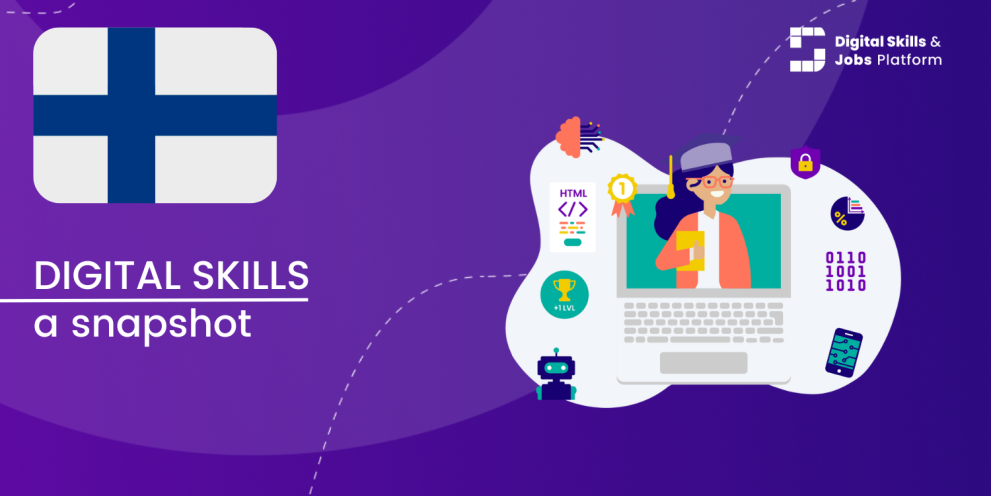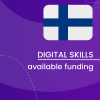Finland: a snapshot of digital skills

Introduction
In the 2024 edition of the Digital Decade report, Finland has achieved 82% basic digital skills coverage compared to the EU average of 55.6% and already above the overall target for the EU 2030 goal, which aims to have 80% of the EU population possessing at least basic digital skills. Additionally, the country has seen an annual growth of 1.8% from the previous year.
According to the Digital Decade report 2024, Finland outperforms in both digital skills indicators. The percentage of ICT specialists in employment has surpassed by far the EU average of 4.8% with a 7.6%
There is no National Coalition in Finland. Nevertheless, the country actively contributes to the development of digital landscape in many spheres.
Overview of state strategies and national initiatives
State strategies
Finland’s Digital Progress Programme (Digiohjelma) was established in 2020 and it ended on March 31, 2023. The Programme aimed to increase the technology and digitalization capabilities of the public sector and to develop cooperation between the public and private sector. Overview of results of the Programme (in English) is available here, while the final evaluation report can be found here (in Finnish). Moreover, Finland continues to implement the Digivisio 2030 Programme and Artificial Intelligence 4.0 Programme which encourages the development and the use of AI in companies.
In addition, Finland’s digital compass – national strategic roadmap extending to 2030 that provides an overview of Finland’s digital transformation. It sets national targets for the effective use of digital systems, so that Finland can succeed in the ongoing transformation. Government report on Finland’s digital compass is published in Finnish, but according to the website, it will be available in English.
National initiatives
Finland’s Recovery and Resilience Plan consists of 39 investments and 18 reforms, supported by €2.1 billion in grants. 50% of the plan will support climate objectives and 27 % of the plan will support the digital transition. Finland's recovery and resilience plan allocates funds for various initiatives to facilitate the country's digital transition. One aspect of the plan involves investing €50 million in the development of high-speed broadband infrastructure across Finland. Additionally, the plan provides €85 million to support the Digirail project, which aims to implement the European Rail Traffic Management System on the entire national railway network by 2040. This project also involves the establishment of the 4G and 5G-based Future Railway Mobile Communication System. The plan further includes €100 million to promote digital innovations in social welfare and healthcare services, €46 million for investments in continuous learning, and €25 million to accelerate the development of key technologies such as microelectronics, 6G, artificial intelligence, and quantum computing. Moreover, the plan dedicates €20 million to streamline work- and education-based immigration processes and facilitate international recruitment.
‘Digitalisation’ projects focus on areas such as:
rail transport digitalisation (Digirail project)
high-speed internet connections throughout the country
further investments in leading edge technologies: 6G networks, artificial intelligence, quantum computing and microelectronics
real-time economy: digital, real-time business processes, e.g. saving receipts and invoices in a standard, machine-readable format
investments in research on cyber and information security.
OdigO: 'The Skillful Tutors of Adults’ and Aging Population’s Digital Competences to Lapland' Project is coordinated by the University of Lapland, with the support of the Lapland University of Applied Sciences. The project’s implementation started in 2021, and it will end on 1st August 2023. Despite Finland's top ranking in Human Capital according to DESI 2022, there is still a significant challenge in ensuring digital inclusion for older individuals. Thus, this project aimed to increase Lapland residents’ awareness of supporting the digital skills of adults and aging populations, through an online programme for seniors. The programme is based on informed research and is accessible to anyone interested in the topic. More information about the project can be found on the website.
Funding opportunities
Funding opportunities for upskilling and reskilling to support the digital competences of individuals and organizations are available in the form of loans, grants, and financial instruments. For the period 2021 – 2026, most of the activities in digital transformation are financed through Recovery and Resilience facility but also as activities in Horizon, Erasmus+, ESIF and EEA grant schemes. You may find more on the page of Finland's Ministry of Economic Affairs and Employment and in the article on the Digital Skills and Jobs Platform.





